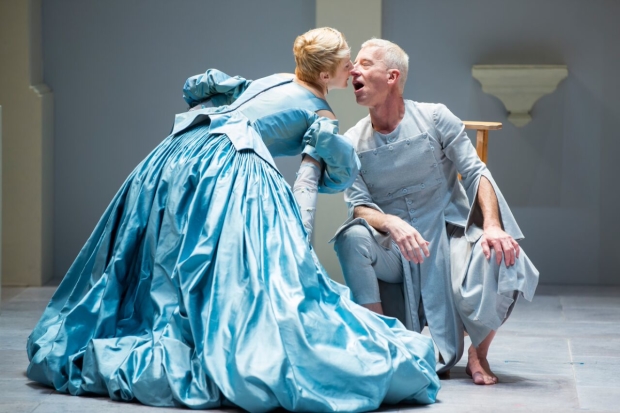Tartuffe

(© Scott Suchman)
All the wit and intelligence Molière packed into Tartuffe 351 years ago is still there in the Shakespeare Theatre Company's muscular new version of the play. All its considerable surface appeal however — from the imaginative adaptation by David Ball to the provocative direction by Dominique Serrand — is fresh and modern.
Tartuffe is the story of a wealthy man, Orgon (Luverne Seifert), who allows a religious hypocrite, Tartuffe (Steven Epp), to invade his home and take over his family and fortune. It is never made clear how Orgon came to trust Tartuffe so completely, but in his eyes, Tartuffe can do no wrong.
Orgon's family, however, sees Tartuffe for what he is: a thoroughly despicable man, greedy and dishonest. Only Orgon's mother, played with crotchety charm by Michael Manuel, believes in Tartuffe. Orgon's daughter, Mariane (Lenne Klingaman) sees through Tartuffe immediately. The family's outspoken housemaid, Dorine (Suzanne Warmanen), tells Orgon that his wife does not feel well; Orgon cares only how Tartuffe feels. When Orgon says that he wants his daughter to marry Tartuffe, the family rebels. Orgon's brother-in-law, Cléante (Gregory Linington), Orgon's son, Damis (Brian Hostenske), Mariane's fiancé, Valère (Christopher Carley), and Orgon's wife, Elmire (Sofia Jean Gomez), conspire to expose Tartuffe in a lie.
Eventually, with Tartuffe on the brink of seducing Elmire, Orgon finally sees what a demon Tartuffe is and tries to throw him out of the house. Only a brilliant deus ex machina allows Orgon's family to be free of the monster in their midst.
The extraordinary success of this Tartuffe is in large part a testament to the vision of its director, Serrand, and the skill of Epp, both cofounders of the Moving Company in Minneapolis. Epp is an unconventional Tartuffe, a character whose role is usually exploited for its absurd humor: the more Tartuffe lies, the more Orgon values him. Here, Epp plays Tartuffe as sinister and vitriolic. He is often compared to a snake, and he invites the comparison by making sinuous movements on the floor.
Seifert creates the perfect foil for Tartuffe, continually allowing himself to be blinded to the fact that Tartuffe's piety is nonexistent. Gomez is a sexy and intelligent Elmire, who knows just how to entice Tartuffe to make him head to his downfall. Klingaman plays a vivacious Mariane who would rather die than marry Tartuffe. As Valère, Carley does a hilarious physical comic turn straight out of the commedia dell'arte book of conventional set pieces.
Linington is one voice of reason in this home turned into a madhouse by Tartuffe. The other is Warmanen, who nobly tries to reason Orgon out of his obsession with Tartuffe. Ross Destiche turns one of Tartuffe's servants into a nasty, threatening presence.
Scenic designers Serrand and Tom Buderwitz have used the immense height and depth of the Sidney Harman Hall to create a massive home for Orgon. The room, which has six long windows and little furniture, gives the impression of being an austere church. Lighting designer Marcus Dilliard bathes the room in white light for most of the play, whose action takes place in one day.
Costume designer Sonya Berlovitz re-creates 17th-century fashion with many layers of elegant fabrics and flouncy petticoats, although she hikes up some hemlines and discards the usual lace cuffs and large wigs for more extraordinary choices.
Serrand's Tartuffe is a fresh take on the comedy of the play. At times malevolent, at times scary, it is clearly no longer a farce. Yet for all its modernity, this production is built on Molière's original, in which the wicked are wicked and the good are good. In such a world, all Tartuffes must be punished. The final vision of Orgon's family and servants barring their home's huge silver door has a majestic finality even King Louis XIV would have adored.










